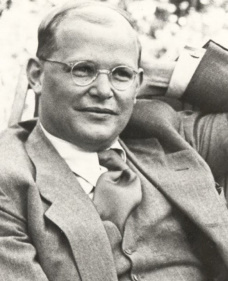
Ordained Pastor, Theologian, Germany
Dietrich Bonhoeffer's was raised by famous parents Karl Bonhoeffer, & Paula Bonhoeffer, née von Hase, in a tradition of Christian humanitarianism and liberalism, he had a great love for life. He gained the equivalent of a bachelor's & master's degree, at the Protestant Faculty of Theology, University of Tübingen. He completed a Doctor of Theology (Dr. theol.) at Berlin University in 1927, graduating summa cum laude.
1928: Curate in Barcelona for a year, he then became lecturer in systematic theology, University of Berlin.
November 15, 1931:, he was ordained at the Old-Prussian United St. Matthew's Church (Lutheran) in Berlin. A brilliant career as an academic theologian lay ahead of him.
1930: Bonhoeffer went to the USA for a year, to attain a Sloane Fellowship. He met Frank Fisher, a black fellow seminarian who introduced him to Abyssinian Baptist Church, Harlem, where he taught Sunday school and formed a love for the African-American church, becoming sensitive to the social injustices experienced by racial and ethnic minorities, and the ineptitude of churches to bring about integration. He became involved with the Ecumenical Christian movement.
1933: Hitler came to power. Bonhoeffer saw the Nazi system as an attempt to make history without God. He spoke out publicly against the Nazi dictatorship, from the beginning, later opposing Hitler's euthanasia program and genocidal persecution of the Jews. The Nazi movement in the Church voted in 'the Aryan paragraph', meaning that pastors and church officials of Jewish descent were to be removed from their posts and the Old Testament removed from the Bible. They made efforts to unify all Protestant churches into a single pro-Nazi Protestant Reich Church, seeming to make Hitler its idol and god. Bonhoeffer protested, and resigned his post at the university. He joined the Confessing Church, those who set the sovereignty of Christ above all, including Hitler. Offered a parish post in eastern Berlin, he refused it, accepting a 2 year appointment as pastor of 2 German-speaking Protestant churches in London.
1935: Bonhoeffer returned to Germany but was forbidden to preach, teach or even enter Berlin, so went to the Confessing Church’s training college on the Baltic coast and directed it until closed by the government.
1939: Bonhoeffer was in the USA doing post-graduate study, when the war began. He felt he must return home to stand with his oppressed and persecuted fellow Christians.
April 1943: He was arrested by the Gestapo and held in prison in Berlin.
1945: Transferred to Buchenwald (Nazi Concentration Camp). He devoted his time to ministering to fellow prisoners, inspiring many, including some of his guards, by his courage and unselfishness. It has been said, in that living hell, he stood like a giant before men, strengthened by his faith and love of God. His poems and writings smuggled out of prison bear eloquent testimony.
Bonhoeffer’s writings on Christianity's role in the secular world have become widely influential, his book The Cost of Discipleship is described as a modern classic. Convinced that religion must be central to life, he explored ways of talking about God in secular language as “the beyond in the midst”, even when this meant freeing Christianity from the strictures of traditional religion.
Dietrich Bonhoeffer was executed by hanging, at Flossenbürg concentration camp only days before it was liberated by the Allies.
BORN: 4 February 1906,
(Breslau, Germany) modern day Wrocław, Poland
DIED: 9 April 1945,
Flossenbürg concentration camp,
Germany
 Welcome
Welcome Calendar
Calendar Today's Word
Today's Word Lauds
Lauds Terce
Terce Sext
Sext None
None Vespers
Vespers Compline
Compline Matins
Matins